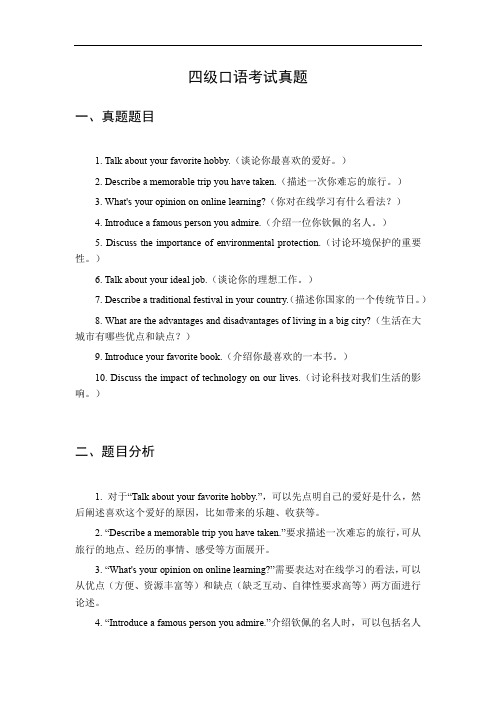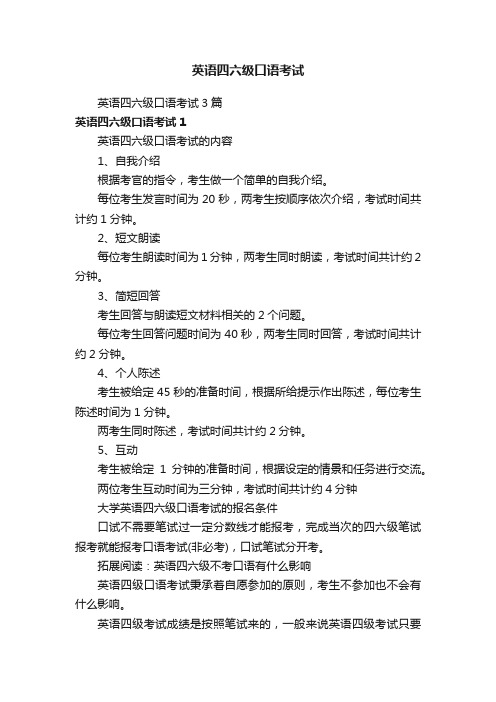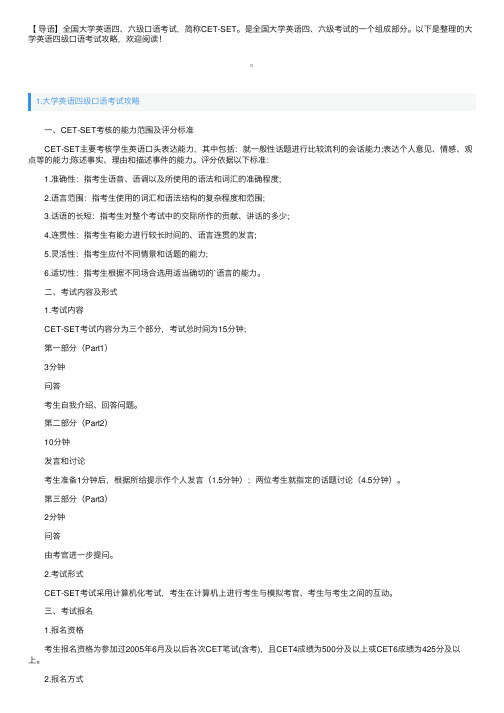大学英语四六年级口语考试
4级口语考试真题

四级口语考试真题一、真题题目1. Talk about your favorite hobby.(谈论你最喜欢的爱好。
)2. Describe a memorable trip you have taken.(描述一次你难忘的旅行。
)3. What's your opinion on online learning?(你对在线学习有什么看法?)4. Introduce a famous person you admire.(介绍一位你钦佩的名人。
)5. Discuss the importance of environmental protection.(讨论环境保护的重要性。
)6. Talk about your ideal job.(谈论你的理想工作。
)7. Describe a traditional festival in your country.(描述你国家的一个传统节日。
)8. What are the advantages and disadvantages of living in a big city?(生活在大城市有哪些优点和缺点?)9. Introduce your favorite book.(介绍你最喜欢的一本书。
)10. Discuss the impact of technology on our lives.(讨论科技对我们生活的影响。
)二、题目分析1. 对于“Talk about your favorite hobby.”,可以先点明自己的爱好是什么,然后阐述喜欢这个爱好的原因,比如带来的乐趣、收获等。
2. “Describe a memorable trip you have taken.”要求描述一次难忘的旅行,可从旅行的地点、经历的事情、感受等方面展开。
3. “What's your opinion on online learning?”需要表达对在线学习的看法,可以从优点(方便、资源丰富等)和缺点(缺乏互动、自律性要求高等)两方面进行论述。
四级考试口语考试内容

四级考试口语考试内容
大学英语四级口语考试考什么:
一般考自我介绍、短文朗读、短文朗读的问题回答一级最后的个人陈述和小组互动。
考生需要准备简短的自我介绍,朗读短文(限时1分钟),朗读完后需要回答与短文有关的问题,考生用1分钟的时间就所给的提示做出自己的个人陈述,最后由两位考生根据给定的情景和任务进行交谈。
口语的考试成绩一般以A、B、C、D四个等级来划分,获得A等级的考生属于英语的交流在口头交际上是没有任何困难的;获得B等级的考生属于英语交流可能有点困难,但不影响口头交际;获得C等级的考生属于在口头交际上只能用简单的英语进行交流;获得D等级的考生属于英语的交流不具备口头交际的能力。
口语的评分标准主要是考查考生在词汇或语法的应用上使用的语调、语音是否得当,词汇、语法结构的复杂程度和范围是否运用正确,语句是否连贯,不同的场景或不同的场合考生的应变能力;考官会从这几方面入手,根据这些给与不同的分数。
语法是语言的基本要素,熟练的掌握和运用语法是语
言基本功的关键,因此,考生还是多多扩充自己的词汇量,还有一些短句,多培养自己的英语思维,通过每一年每一日的坚持,多加深自己对词汇、短句、语法的印象,这样才能增强自己的英语交际能力。
四六级口语考试说明

四六级口语考试说明大学英语四、六级考试口语考试(CET Spoken English Test,简称CET-SET)用于测量我国大学生运用英语进行口头交际的能力。
考试分为全国大学英语四级口语考试(CET-SET4),全国大学英语六级口语考试(CET-SET6)。
1.报考资格从2016年11月起,口试不需要笔试过一定分数线才能报考,完成当次的四、六级笔试报考就能报考口语考试(非必考),口试笔试分开考。
每年5月的口语考试对应6月份的笔试,11月的口语考试对应12月份的笔试。
2.考核要求及考核的技能大学英语四、六级口语考试主要考核学生的英语口头表达能力,具体为:就熟悉话题进行比较流利的会话能力;表达个人意见、情感、观点的能力;陈述事实、理由和描述事件的能力。
考试采用计算机化考试。
考生在计算机上进行考生与模拟考官、考生与考生之间的互动。
请提前登录全国大学英语四、六级考试网站(),熟悉考试流程。
口语部分考核学生就熟悉的话题用英语进行口头表达与交流的能力。
口语部3.考试时间口语考试每年举行两次,分别在5月和11月,各自对应6月份和12月份的两次笔试。
4.报考方法和成绩查询考生登录全国大学英语四、六级考试网站()点击<CET口试报名>栏目进行报名,完成信息填报、选择考点、网上缴费等报名手续。
考生也可以安装“CET”手机APP,完成报名。
“CET”手机APP现在具备口试报名、口试准考证打印、口试成绩推送等功能。
成功完成报名的考生登录全国大学英语四、六级考试网站()或手机APP自行打印准考证;考生的考试具体时间及地点均以准考证上所示为准,不得更改。
成绩查询时间,分别为每年的八月和二月的中下旬,与笔试成绩一同公布。
具体发布的时间和方式以全国大学英语四、六级考试网站()发布的公告为准。
成绩报告单将同时报道口试成绩及同一考次的笔试成绩,如考生仅参加笔试,成绩报告单照常发放,口试成绩栏部分显示为空;成绩单将发至笔试报考学校。
四级口语考试题型

四级口语考试题型一、口语考试常见题型概述在四级口语考试中,常见的题型包括个人陈述、看图描述、问题回答、情景对话以及听力复述等。
二、个人陈述在个人陈述环节,考生需要根据给定的话题进行自我介绍或者阐述个人观点。
例如,以下为一个个人陈述范例:话题:描述一个你喜欢的电影范例:我想和大家分享一部我非常喜欢的电影,它叫《肖申克的救赎》。
这部电影是由导演弗兰克·德拉邦特执导,根据作家斯蒂芬·金的同名小说改编而成。
故事讲述了一名银行家安迪·杜弗雷恩因被错误指控谋杀妻子和情人而被判两个终身监禁的故事。
他在监狱中结识了著名囚犯瑞德,并与他建立了深厚的友谊。
安迪通过帮助瑞德洗白自己的名誉,最终实现了令人难以置信的逃离监狱并获得自由的壮举。
这部电影不仅有一个扣人心弦的故事情节,还展现了友情、希望和自由的力量。
它通过深入描绘角色的情感和内心世界,给观众留下了深刻的印象。
我喜欢这部电影的原因之一是它的剧情紧凑,不仅让人紧张激动,同时又有许多令人感动的时刻。
此外,这部电影还有令人难以预料的反转和令人惊奇的结局,给观众留下了深刻的印象。
总的来说,这是一部思想深刻、情感真挚、发人深省的电影。
我强烈推荐大家一定要去看一看!三、看图描述在看图描述环节,考生需要根据提供的图片进行描述。
以下为一个看图描述的范例:范例:图片展示了一幅城市夜景,我们可以看到高楼大厦与灯火辉煌的街道。
从图片中可以感受到这个城市的繁华和活力。
首先,我们可以看到许多高楼大厦耸立在城市的中心,楼顶和窗户的灯光闪烁不定,给城市增添了无穷的魅力。
另外,街道两侧的霓虹灯和路灯照亮了整个城市,给行人和司机提供了良好的照明。
此外,我们还可以看到一些汽车和行人在街道上穿行。
汽车的尾灯和前灯投射出一条条明亮的光线,行人则穿行于人行道上,或急匆匆地赶路,或悠闲地散步。
总的来说,这幅图片展现了一个夜晚的繁华城市。
在这里,高楼大厦、灯火辉煌的街道和熙熙攘攘的人群交织在一起,构成了这个城市的夜间美景。
英语四六级口语考试

英语四六级口语考试英语四六级口语考试3篇英语四六级口语考试1英语四六级口语考试的内容1、自我介绍根据考官的指令,考生做一个简单的自我介绍。
每位考生发言时间为20秒,两考生按顺序依次介绍,考试时间共计约1分钟。
2、短文朗读每位考生朗读时间为1分钟,两考生同时朗读,考试时间共计约2分钟。
3、简短回答考生回答与朗读短文材料相关的2个问题。
每位考生回答问题时间为40秒,两考生同时回答,考试时间共计约2分钟。
4、个人陈述考生被给定45秒的准备时间,根据所给提示作出陈述,每位考生陈述时间为1分钟。
两考生同时陈述,考试时间共计约2分钟。
5、互动考生被给定1分钟的准备时间,根据设定的情景和任务进行交流。
两位考生互动时间为三分钟,考试时间共计约4分钟大学英语四六级口语考试的报名条件口试不需要笔试过一定分数线才能报考,完成当次的四六级笔试报考就能报考口语考试(非必考),口试笔试分开考。
拓展阅读:英语四六级不考口语有什么影响英语四级口语考试秉承着自愿参加的原则,考生不参加也不会有什么影响。
英语四级考试成绩是按照笔试来的,一般来说英语四级考试只要是达到220分以上就可以颁发成绩单,一般来说不设及格标准,但是一般来说把425分做为英语四级考试的及格标准,因为只有达到425以上才能考英语六级考试。
口语考试对总体成绩是没有影响的,不是要求必须考取的项目,考下英语四级口语,也不单独发成绩单,在笔试成绩单上统一体现成绩。
英语四六级口语考试2考试介绍1、考试对象:大学英语四、六级考试口语考试(CET Spoken English Test ,简称CET-SET)用于考察大学生运用英语进行口头交际的能力。
CET-SET 报考对象为获得全国大学英语四、六级证书且成绩达到一定分数线的在校大学生。
教育部规定,四级笔试550分、六级520分以上的考生可以报名参加口试。
2、考试时间及地点:四、六级口语考试为一年两次,分别在5月和11月。
考试地点在考生报名的考点,具体考场在考生报名后随机编组确定。
大学英语四级口语考试攻略

【导语】全国⼤学英语四、六级⼝语考试,简称CET-SET。
是全国⼤学英语四、六级考试的⼀个组成部分。
以下是整理的⼤学英语四级⼝语考试攻略,欢迎阅读!1.⼤学英语四级⼝语考试攻略 ⼀、CET-SET考核的能⼒范围及评分标准 CET-SET主要考核学⽣英语⼝头表达能⼒,其中包括:就⼀般性话题进⾏⽐较流利的会话能⼒;表达个⼈意见、情感、观点等的能⼒;陈述事实、理由和描述事件的能⼒。
评分依据以下标准: 1.准确性:指考⽣语⾳、语调以及所使⽤的语法和词汇的准确程度; 2.语⾔范围:指考⽣使⽤的词汇和语法结构的复杂程度和范围; 3.话语的长短:指考⽣对整个考试中的交际所作的贡献、讲话的多少; 4.连贯性:指考⽣有能⼒进⾏较长时间的、语⾔连贯的发⾔; 5.灵活性:指考⽣应付不同情景和话题的能⼒; 6.适切性:指考⽣根据不同场合选⽤适当确切的`语⾔的能⼒。
⼆、考试内容及形式 1.考试内容 CET-SET考试内容分为三个部分,考试总时间为15分钟; 第⼀部分(Part1) 3分钟 问答 考⽣⾃我介绍、回答问题。
第⼆部分(Part2) 10分钟 发⾔和讨论 考⽣准备1分钟后,根据所给提⽰作个⼈发⾔(1.5分钟);两位考⽣就指定的话题讨论(4.5分钟)。
第三部分(Part3) 2分钟 问答 由考官进⼀步提问。
2.考试形式 CET-SET考试采⽤计算机化考试,考⽣在计算机上进⾏考⽣与模拟考官、考⽣与考⽣之间的互动。
三、考试报名 1.报名资格 考⽣报名资格为参加过2005年6⽉及以后各次CET笔试(含考),且CET4成绩为500分及以上或CET6成绩为425分及以上。
2.报名⽅式 采⽤全国上集中报名⽅式,考⽣可在全国范围内选择考点;缴费和领取准考证由考⽣在上⾃主完成。
CET站在每次考试前公布⼝语考点。
四、成绩等级 CET-SET成绩分为A,B,C,和D四个等级,各等级的描述见下表。
A等 能⽤英语就熟悉的题材进⾏⼝头交际,基本上没有困难。
四级口试主要考什么题型

四级口试主要考什么题型
四级口试,即英语四级口语考试,是中国大学英语四六级考试体系中
的一部分,主要测试学生的英语口语能力。
四级口试的题型主要包括
以下几个方面:
1. 自我介绍:考生需要用英语进行自我介绍,包括姓名、学校、专业、兴趣爱好等基本信息。
2. 短文朗读:考生会得到一段英文材料,需要在规定时间内朗读出来,考察发音、语调和流利度。
3. 回答问题:考生需要根据所读材料回答考官提出的问题,这考察考
生对材料的理解能力和即兴反应能力。
4. 图片描述:考生会得到一张图片,需要用英语描述图片内容,考察
描述能力和语言组织能力。
5. 角色扮演:考生需要根据给定的情景扮演角色,与考官进行对话,
考察交流能力和情景反应能力。
6. 小组讨论:考生会与另一位考生组成小组,共同讨论一个话题,考
察团队合作和交流能力。
7. 即兴演讲:考生需要根据给定的题目进行即兴演讲,考察语言组织
和表达能力。
8. 综合任务:考生可能需要完成一些综合任务,如根据图片和文字信
息进行描述、根据问题进行讨论等。
四级口试的评分标准通常包括语言准确性、流利度、发音、词汇使用、语法结构、内容相关性和逻辑性等方面。
考生在准备四级口试时,应
该注重这些方面的训练,以提高自己的口语表达能力。
英语四六级口语考试怎么考考试流程有哪些

英语四六级口语考试怎么考考试流程有哪些英语四六级是大学中比较重要的考试,那么英语四六级口语考试流程是什么?下面是由编辑为大家整理的“英语四六级口语考试怎么考考试流程有哪些”,仅供参考,欢迎大家阅读本文。
英语四六级口语考试流程1、四级自我介绍考试过程:根据考官指令,每位考生作一个简短的自我介绍。
答题时间:每位考生发言20秒(两位考生依次进行)。
四级口试中的自我介绍为整场口试的热身,目的是帮助考生放松心情、自然应考。
因此不需要长篇大论,可以简单描述一下自己的名字、籍贯、学校、性格、爱好等即可。
2、四级短文朗读考试过程:考生准备45秒后朗读一篇120词左右的短文。
答题时间:每位考生朗读1分钟(两位考生同步进行)。
朗读时要运用英语发音的基本技巧,如连读、同化、浊化、声调变化等,做到发音清晰、自然。
如果文章中有生词也不要紧张,可以根据自己已掌握的发音规则推断其发音。
读文章时要做到语速适中、停顿有章,即使偶尔有读错的地方,也不要去纠正,继续下文的朗读。
3、四级简短问答考试过程:考生回答2个与朗读短文有关的问题。
答题时间:每位考生每题发言20秒(两位考生同步进行)。
本部分的问题由模拟考官直接说出,而且考生没有准备时间,因此,考生一定要认真听,并做好笔记。
作答时,考生简单说明自己的观点即可,但是条理要清晰,注意控制表达时间。
4、四级个人陈述考试过程:考生准备45秒后,根据所给提示作陈述。
答题时间:每位考生发言1分钟(两位考生同步进行)。
考生在准备时可按照“描述图片——引出问题——分析原因——提出建议”的结构展开。
在答题的过程中务必仔细观察所给的图片信息,尤其是其中的文字信息,确保不会偏题。
5、四级双人互动考试过程:考生准备1分钟后,根据设定的情景和任务进行交谈。
答题时间:两位考生互动3分钟。
此部分要求两位考生根据所给的情景和任务进行交流和讨论,准备时间为1分钟,考查考生传达信息、发表意见、参与讨论和进行辩论等口头交际能力。
- 1、下载文档前请自行甄别文档内容的完整性,平台不提供额外的编辑、内容补充、找答案等附加服务。
- 2、"仅部分预览"的文档,不可在线预览部分如存在完整性等问题,可反馈申请退款(可完整预览的文档不适用该条件!)。
- 3、如文档侵犯您的权益,请联系客服反馈,我们会尽快为您处理(人工客服工作时间:9:00-18:30)。
1. What’s your name?2. Does your name have any special meaning?3. Where do you come from?4. What kind of landscape surrounds your hometown?5. What is the main crop in your hometown?6. What is the difference between Beijing and your hometown?7. What are the main places of interest in your hometown?8. What is the climate like in your hometown?9. What is the character of the people like in the region where you live?10. What are the differences in accent between the people of your hometown and Beijing?11. What is people’s favorite food in your region?12. How do you make dumplings?13. What do you do during the Spring Festival?14. Why is the Spring Festival so important to Chinese people?15. Can you describe one of the main festivals celebrated in your country?16. Tell me something about the Lantern Festival.17. Tell me something about the Qing Ming Festival.18. Tell me something about the customs of your country.19. How long have you lived in Beijing?20. What is the weather like in Beijing?21. How do you compare the climate in Beijing with that in your hometown?22. What place in Beijing do you like best? Why ?23. Which is the worst place you’ve been to China?24. Which is the best place you’ve been to China?25. What places in Beijing should a foreigner visit? Why?26. What are the major social problems in Beijing? How can they be solved?27. What is the biggest problem China faces?28. What places in Beijing should a foreigner visit? Why?29. Could you tell me something about your family?30. Have you any children?31. What is your child’s name? Does his name have a meaning?32. What does your wife/husband do?33. When did you get married?34. Describe your wedding.35. How have weddings changed in recent years?36. Are there any special customs about wedding in your region?37. Describe a traditional wedding ceremony.38. Where did you go for your honeymoon?39. Did you have to ask for permission from your parents before you got married?40. Is it acceptable for couples to live together without marrying?41. Where do you think a newly couple should live? Living with their parents or on their own?42. What responsibilities should a couple take?43. How do Chinese usually celebrate birthdays?44. Are there any traditions concerning the birth of a baby?45. What kind of parent do you intend to be?46. What do you think of One-Child Policy in China?47. Why do people in China traditionally want to have a son?48. What difficulties do Chinese farmers have concerning their old age?49. What do you thin k needs to be done in order to relieve the farmer’s worries?50. What hope or fears do you have for your children?51. What sort of culture do you hope your child will grow up in?52. Are you going to bring up your child differently from the way you were brought up? How?53. Do you enjoy shopping?54. Who does most of the shopping in your family?55. What are you good at cooking? What is your favorite dish?56. Who does most of cooking in your family?57. Is there sex discrimination in China?58. How do you sum up women’s conditions in China?59. What are the causes of sex discrimination?60. Should government pay certain salaries to those housewives? Why or why not?61. Would you want your wife to continue with her career or to stay at home taking care of the household after you get married?62. Have you ever wished to be one of the opposite sex? Why (why not)?63. What would you do if your next-door neighbour were noisy nearly all the time?64. Do you have a lot of friend?65. What does friendship mean to you? What kind of people do you make friend with?66. What is your major?67. How do you like your major?68. When and where did you graduate? What qualifications have you obtained?69. Do you still remember your school days?70. What impressed you most when you were at university?71. Which is the best university in your country?72. Could you sum up your own study habits in a few points?73. What do you think of the practice of setting up key schools in primary and secondary school education in China?74. Do you think the subjects you are studying today are relevant to present-day society? Why ?75. What do you think education should be? Should it be a process of learning what is useful for your future life or should it be simply learning for enjoyment? Why?76. What do you do for a living?77. What do you do in the office every day?78. Since your job seems too professional to me, could you explain it in detail?79. What are your job prospects?80. If you had the opportunity to change your job, what would you do with it?81. Do you have any ambitious?82. Will any possible future changes affect your job in any way?83. What are your spare time interests?84. How do you spend your weekends?85. What is your favorite sport? What are the rules?86. What is the most popular sport in your country?87. What are the sporting facilities like in your university/Beijing?88. What do you know about Qigong? Do you believe in Qigong?89. What do you do in your spare time?90. Do you often read newspapers? If not, why ones do you read?91. What do you think of computer?92. Do you think computer has changed our life so much?93. Do you often go to the cinema/theatre?94. What kind of films do you like best?95. Do you often watch TV? What is your favorite program?96. Do you think watching TV too much is a waste of time?97. What kind of music do you enjoy?98. Who is your favorite film star? Will you describe him/her to me?99. Do you enjoy travelling?100. Where have you been travelling to? Which place interested you most?101. Do you smoking?102. Do you think smoking is a problem that needs special attention and has to be solved? If so, why?103. What do you know about XXX?104. What problem do you think you will have in XXX?105. How will you overcome the difficulties?106. Do you think you will be able to cope with English-demands of your intended study program in XXX?107. What difficulties do you think you’ll encounter in your studies in XXX ?108. Can you imagine what life in Britain/Canada/Australia/London, etc. would be like?109. How will you fare in Britain/Canada/Australia, etc. without your family?110. What do you intend to study?111. Which university are you going to study at?112. Why did you choose this university?113. Where are you going to study in XXX?114. What are you plans in XXX?115. What is your research proposal all about?116. What do you hope for most from your study abroad?117. Will your study abroad help your job prospects after come back to China?118. Should you study more theory or do more practice? Give your reasons, please.119. What kind of differences in the cultures are you expecting between China and the XX?120. How will your study in Britain benefit your work in China when you come back to China?121. What do you intend to do after you finish studying?122. What will be your main problem when you are study in a foreign country?123. What problem can you foresee in the future when you come back to China?124. Will there be any adjustment problems in your life when you come back to China? If so, what are they?125. Will you have to make any changes in your work/life when you come back to China?126. Do you think there will be a gap between your knowledge gained in China and the level of knowledge you are going to encounter on arrival? If so, what will it be?127. What do you think of the future of China keeps an open policy?128. What do you regard as the most significant events in your country’s recent history?129. Are there any special places you want to see in Canada? What are they?130. What do you especially want to do in Canada?131. How do you like your life in ******* University?132. What do you think of the training in the university?133. In what way do you think university training is helpful or falls short?134. What aspect of English do you find the most difficult?135. Do you find American English easier to understand than Britain English?136. What sports are played in your country?137. Could you describe the traditional architecture of your country?138. What role dose religion play in everyday life in your country?139. What would you regard as the most significant events in your country’s recent history?140. How aware do you think people are nowadays about environmental issues?141. Could you tell me why you chose to study at the university of ****?142. What role dose tourism play in your country’s economy?143. How serious is unemployment in your country?144. In your opinion, what are the most serious problems associated with modern life?145. What do you think have been the most important changes in your field over the past 5 years?146. What are you going to major in ?147. Are you going to do your own cooking when you are at university?148. Some local students feel that overseas students get preferential treatment. What is your opinion?149. Do you think you will be able to cope with the English-language demands of your intended program?150. What do you think are the main causes of road accidents?151. Do you think the government is doing enough to prevent road accidents?152. As there are more and more private cars, what do you think the government should do in order to encourage citizens to use public transport?153. How do you see yourself in ten years’ time?154. Have you ever thought to have your own business?155. What business do you hope to have?156. Do you know about any policies about opening a business abroad?157. What are your plans for your future?158. Why do you think there are more and more people leaving to immigrate to other countries?159. Is it good for China that so many people are going to other countries?160. Will your life change a lot after you immigrate to XXX?161. What will you do if you are ill abroad?162. Do you know what to do in case of emergency?163. What will do if you cannot find a job in XXX?164. Why do you want to immigrate to XXX?165. What will you do after the IELTS test?166. What will do if you fail the IELTS test?167. How long have you been learning English?168. What troubles you most at the moment?169. Does your family support your decision on going XXX?1) take a rain check 延期2) lost count 弄不清楚3) be in another world 精神恍惚;魂不守舍4) make yourself at home 随意,随便5) save your breath 省口气吧;别白费口舌了6) make sense 有意义,理解7) cost sb. an arm and a leg 非常昂贵8) burn a hole in one's pocket 很快地被花光9)fill one's shoes 很好地顶替;令人满意地替代10)is ice cold 表示理所当然11)like apples and oranges 用来表示无法相比的事物12)wait until the last minute 直到最后一刻13)lose one's train of 忘记14)meet each other half way 相互妥协,让步15)on the dot 准时;正点16)once and for all 最后一次;干脆17)out of earshot 不在听力所及范围18)out of this world 非常好19)play by ear 随机应变,视情形而定20) ring a bell 令人想起某件事;听起来耳熟21)share a common outlook 有共同的观点22)six of one and half-a-dozen of the other 半斤八两;没什么区别23)stick around 在附近逗留或等待24)stick with 继续做,坚持25)straighten out 扯平;结清26)toss and turn (身体)翻来覆去(通常表示难以入睡)27)turn one's back (在别人遇到困难时)不愿帮助28)under the weather 身体不适,生病29)bite off more than one can chew 贪多嚼不烂;心有余而力不足;不自量力;力不从心30)break new ground 创新31)do the trick 做成功;达到理想的结果32)drag one's feet 行动缓慢;磨磨蹭蹭不情愿33)draw the line 拒绝,拒不容忍34)feel down in the dumps 心情不好;情绪低落35)few and far between 不多;少而分散的;不常碰到或发现的;稀少的36)fit as a fiddle 身体很健康37)grin and bear 任劳任怨;毫无怨言地忍受38)hit the spot (特指吃了食物,喝了饮料之后)精神完全恢复过来或感到满足;恢复精力;提精神39)keep between the two of us 不让第三者知道,保密40)know a thing or two about 略知一二1.I’m an office worker. 我是上班族。
